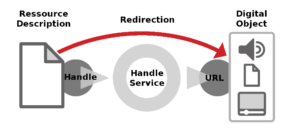Persistent identifiers (PIDs) are an abstraction layer that arbitrates between the reference of a digital object and its location. Since URLs as location tend to change over time for whatever reason they are obviously inappropriate as stable references, but they are ubiquitously given as locations of digital objects. The abstraction layer of PID can be seen as a pointer to the location and becomes a necessary precondition (but is not sufficient: see ‘Who is responsible for the correct PID resolution?’) for any stable referencing in the web. 
The analogy in the library world is the shelfmark and the insight that the mark in the bookshelf is not the correct way to point to the book, because the place of the book in the shelf tends to change over time for whatever reason.
In order to become a real pointer to the location of the digital object a resolution infrastructure for PIDs is necessary. The analogy here is the order of the books depending on the alphanumerical order of the shelfmarks.
ePIC uses Handles, a special kind of PIDs that comes with an intrinsic global but distributed resolution mechanism (see also ‘How is the resolution of a Handle organized?’) and provides therefore a particularly reliable infrastructure.
